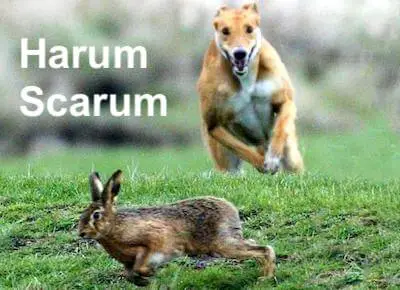‘Harum-scarum’ behaviour is that which is reckless and carelessly wild.
Harum-scarum
What's the meaning of the phrase 'Harum-scarum'?
What's the origin of the phrase 'Harum-scarum'?
Harum-scarum is now an archaic expression and I doubt that many millennials would come across it very often.
It is a British expression dating from the late 17th century. It was used both to describe wild behaviour and as a name for the young ‘harum-scarums’ who indulged in it.
As to the origin of this odd reduplicated phrase, some have suggested that it is formed by an amalgamation of hare and scare. Several early dictionary entries list the phrase as hare’em and scare’em or hare’um and scare’um.
That suggestion uses the verb ‘to hare’ in an allusion to the manner of a hare being chased, which is fast and wildly erratic.
However, the earliest example of the expression in print, and several others, differ slightly and are spelled ‘harum starum’, which doesn’t correspond with the above explanation. That citation is in John Ray’s A Collection of English Words Not Generally Used, 1691:
To Hare, to affright or make wild: to go harum starum.
Starum isn’t a word in its own right and may just be a nonsense word added just to make the rhyme, which is often the case with reduplicated phrases.
The history of “Harum – scarum” in printed materials
Trend of harum – scarum in printed material over time
Related phrases and meanings
Browse more Phrases
About the Author

Phrases & Meanings
A-Z
A B C D E F G H I J K L M N O P Q R S T UV W XYZ
Categories
American Animals Australian Bible Body Colour Conflict Death Devil Dogs Emotions Euphemism Family Fashion Food French Horses ‘Jack’ Luck Money Military Music Names Nature Nautical Numbers Politics Religion Shakespeare Stupidity Entertainment Weather Women Work
How did we do?
Have you spotted something that needs updated on this page? We review all feedback we receive to ensure that we provide the most accurate and up to date information on phrases.
